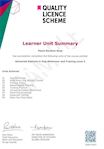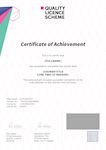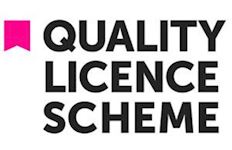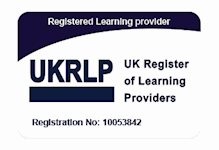Level 3 Advanced Diploma in Diabetes Awareness with Official Certification
Summer Sale | Accredited by The Quality License Scheme | Endorsed Certificate | Certified Unit Summery| 24/7 Access
Global Edulink
Summary
Overview
Level 3 Advanced Diploma in Diabetes Awareness with Official Certification
This course is endorsed under the Quality Licence Scheme.
The Advanced Diploma in Diabetes Awareness – Level 3 gives learners an understanding of diabetes and how it can affect people. Diabetes is a condition that has impacted millions of people around the world and the course is an excellent way to learn more about this disease, the symptoms and treatment options. Additionally, the course will direct learners on how to provide the best care for patients afflicted with diabetes.
The course will feature key topics which include types of diabetes, medication and how to lead a healthy life despite having the condition. Healthcare professionals who want to gain an in-depth understanding of diabetes will find this course highly useful in terms of how to assist with clinical duties, promote positive mental health and how to communicate with the patient’s family.
The Advanced Diploma in Diabetes Awareness – Level 3 course will fully equip learners on how to provide the best support and care to diabetic individuals. It is a comprehensive course that will focus on short and long-term risks and how to ensure diabetic patients live their day to day lives in a healthy manner. The qualification is effective particularly for healthcare professionals who are interested in acquiring more knowledge about this condition.
The course has been endorsed under the Quality Licence Scheme. This means that Global Edulink has undergone an external quality check to ensure that the organisation and the courses it offers, meet defined quality criteria. The completion of this course alone does not lead to a regulated qualification* but may be used as evidence of knowledge and skills gained. The Learner Unit Summary may be used as evidence towards Recognition of Prior Learning if you wish to progress your studies in this subject. To this end the learning outcomes of the course have been benchmarked at Level 3 against level descriptors published by Ofqual, to indicate the depth of study and level of demand/complexity involved in successful completion by the learner.
The course itself has been designed by Global Edulink to meet specific learners’ and/or employers’ requirements which cannot be satisfied through current regulated qualifications. The Quality License Scheme endorsement involves robust and rigorous quality audits by external auditors to ensure quality is continually met. A review of courses is carried out as part of the endorsement process.
*Regulated qualification refers to those qualifications that are regulated by Ofqual / CCEA / Qualification Wales
Achievement
Course media
Description
What is covered in this course?
- Gain a clear understanding of the job role as a healthcare professional and how you can provide assistance to diabetic patients.
- Understand the types of diabetes and the complications it can have on a person’s physical body.
- Learn about the types of treatment.
- Understand how diabetes can have an impact on a person’s overall wellbeing.
- Learn how to monitor the disease and provide support to people with this condition.
- Qualify in Diabetic Awareness so that you can work various roles in well-paid positions and have room for career progression.
Course Curriculum (Type Of Course Material: Text)
Module 01: What is Diabetes?
1.1 Understanding Diabetes
1.2 What is diabetes, and who gets it?
1.2.1 Understanding diabetes
1.2.2 Who is susceptible to diabetes?
1.3 Common symptoms and diagnosis
1.3.1 Testing for and diagnosing diabetes.
1.4 Type 1 Diabetes
1.4.1 Managing type 1 diabetes
1.5 Type 2 Diabetes
1.5.1 Managing type 2 diabetes
Module 02: Other types of diabetes
2.1 Type 3 Diabetes
2.2 Gestational Diabetes, MODY, LADA, and other types of diabetes
2.3 Preparing for your first appointment
Module 03: Medications
3.1 Treatment and Care for All Types
3.2 Understanding Treatment Options
3.2.1. Diet and Exercise
3.2.2 Glucose Management
3.3 Testing Glucose and Hemoglobin
3.3.1 Creating a Testing Schedule
3.3.2 Choosing a Meter
3.3.3 Testing Your Blood Sugar
3.3.4 Continuous Monitoring Systems
3.3.5 Testing Hemoglobin
3.4 Treating with Insulin –Injectable and Devices
3.4.1 Insulin in the Body
3.4.2 Dosing Insulin
3.4.3 Insulin Devices
3.4.4 Injecting Insulin
3.5 Non-Insulin Injectable
3.6 Oral Medications
Module 04: Avoiding Diabetes
4.1 How to Avoid Diabetes Complications
4.1.1 Cardiovascular Complications
4.1.2 Neurological Complications
4.1.3 Other Nerve Related Complications
4.1.4 Complications in the Teeth and Gums
4.1.5 Musculoskeletal Complications
4.1.6 Eye Complications
4.1.7 Skin Disorders
4.1.8 Sleep Disorders
4.1.9 Other Complications
4.2 Patient Advocacy: Know Your Rights
Module 05: Symptoms
5.1 Managing Your Symptoms
5.2 Hypoglycemia and Hyperglycemia
5.2.1 Hypoglycemia Signs and Symptoms
5.2.2 Causes of Hypoglycemia
5.2.3 Hypoglycemia Treatment
5.2.4 Hypoglycemia Prevention
5.2.5 Hyperglycemia Signs and Symptoms
5.2.6 Causes of Hyperglycemia
5.2.7 Hyperglycemia Treatment
5.2.8 Hyperglycemia Prevention
5.3 Battling Fatigue and Low Energy
5.4 Taking Control of Weight Fluctuations
5.5 Neuropathy
5.5.1 Peripheral Neuropathy
5.5.2 Treatment for Peripheral Neuropathy
5.5.3 Autonomic Neuropathy
5.5.4 Proximal Neuropathy
5.5.5 Focal Neuropathy
5.6 Skin Conditions and Diabetes DERMADROMES
5.6.1 Rashes, Bumps, Bruising, Blisters and Diabetes
5.6.2 Non-Diabetes Related Skin Conditions
5.6.3 Diabetes and Fungal and Bacterial Infections
5.7 Diabetes and Mental Health
5.7.1 Your Feelings Are Normal
5.7.2 Mental Health Issues Related to Diabetes
5.7.3 Ways to Care for Mental Health
Module 06: Maintaining a healthy life
6.1 Practicing Self Care: Diet and Lifestyle
6.2 Nutrition for Diabetes
6.2.1Balanced Eating – What does it mean?
6.3 Understanding Macronutrients
6.3.1 Carbohydrates
6.3.2 Proteins
6.4 Fibers, Sugars, and Sodium in the body
6.4.1 Non-Starchy Vegetables
4.3.2 Whole Grains
4.3.3 Sugars
4.3.4 Sodium
6.5 Food Shopping and Dining Out
6.5.1 Eating out with Diabetes
6.5.2 Reading a product label
6.5.3 The Healthy Plate
6.6 Developing a Healthy Exercise Routine
6.6.1 Before you Exercise
6.6.2 Hypoglycemia and Exercise
6.6.3 What exercise is best for Diabetics?
6.7 Diabetes and Sexual Health
6.7.1 Physical effects on sexual health
6.7.2 Emotions and sexual health
6.7.3 Women’s Sexual Health and Family Planning
6.7.4 Diabetes and Menopause
6.7.5 Men’s Sexual Health
6.7.6 Adolescents and Sexual Health
Module 07: Being healthy
7.1 Long-Term Management for a Happy, Healthy Life
7.2 It’s Okay to not be Okay
7.2.1 Accepting the Disease
7.2.2 Healthy Coping
7.3 Developing and Sticking with a Treatment Plan
7.3.1 Initial Plan
7.3.2 Ongoing Management
7.4 Finding the Right Doctors, Clinics and Practitioners
7.4.1 Primary Care Physician (PCP)
7.4.2 Endocrinologist
7.4.3 Care Manager
7.4.4 Certified Diabetes Educator (CDE)
7.4.5 Registered Dietitian Nutritionist (RDN)
7.4.6 Dentist
7.4.7 Ophthalmologist (eye doctor)
7.4.8 Podiatrist (foot doctor)
7.4.9 Pharmacist
7.5 How to Prepare for Emergencies
7.5.1 Preparing for Hypoglycemia (low blood sugar)
7.5.2 Diabetic Hyperglycemia
7.5.3 Sick Day Management
7.5.4 Preparing for Natural Disasters (tornado, hurricane, flood, etc)
7.6 Diabetes at School and in the Workplace
7.6.1 Diabetes in School
7.6.2 Diabetes in the Workplace
7.7 Getting Support from Family and Friends
7.8 Reach Out: Online Communities, Forums and Groups
7.9 Diabetes Resources in Your Area
Access Duration
The course will be directly delivered to you, and you have 12 months access to the online learning platform from the date you joined the course. The course is self-paced and you can complete it in stages, revisiting the lectures at any time.
Method of Assessment
At the end of the Advanced Diploma in Diabetes Awareness Level 3 you will be evaluated through written assignments. In order to complete this programme successfully, all students are required to complete a series of assignments. The completed assignments must be submitted via the online portal. Your instructor will review and evaluate your work and provide your feedback based on how well you have completed your assignments.
Certification
At the end of this course, successful learners will receive a Certificate of Achievement from the Quality License Scheme and a Learner Unit Summary (which lists the components the learner has completed as part of the course).
Course Code: QLS-03767
Accredited Body (Accreditation)
The Quality License Scheme has a long-established reputation for providing high quality vocational qualifications across a wide range of industries. The Quality License Scheme has over 180 years of expertise combined with a responsive, flexible and innovative approach to the needs of our customers.
Renowned for excellent customer service, and quality standards, The Quality License Scheme also offers regulated qualifications for all ages and abilities post-14; all are developed with the support of relevant stakeholders to ensure that they meet the needs and standards of employers across the UK.
What's special about us
- No Hidden Fees
- Efficient and effective customer service for all your queries
- Endorsed under the Quality Licence Scheme
Who is this course for?
- Healthcare professionals
- Nursing Home staff, Carers, Support Workers and Care Assistants
- Anyone who wants to gain awareness on diabetes
Requirements
- There are no formal pre-requisites for this course
- Individuals looking to gain awareness and acquire skills on diabetes
Career path
- Healthcare Administrator
- Customer Service Representative
- Nursing Supervisor
- Caregiver
- atient Caregiver
Others jobs you can get
- Social Care Worker
- Nursing Staff
Questions and answers
Are there any hidden charges like certificate or assessments? The whole course is fir £129 with assessing and certificate?
Answer:Dear Student, Thank you for your query. There is no hidden fee, £129 is the total price including the certificate and assessment. Regards, Student Support team
This was helpful.Can this certificate help me towards higher education too ? Or it’s only skills related ?
Answer:Dear Bushra Thank you very much for your query. At the end of this course successful learners will receive a Certificate of Achievement from ABC Awards and Certa Awards and a Learner Unit Summary. Which will be usefull to your further studies and career. Hurry up to grab the discount, as it ends soon. Regards, Student Support Team.
This was helpful.Does this allows me to look after diabetic patients in primary care as HCA. As I already work as an HCA
Answer:Dear Bushra Thank you very much for your query. The Career path as follows Healthcare Administrator Customer Service Representative Nursing Supervisor Caregiver atient Caregiver Hurry up to grab the discount, As it ends soon. Regards, Student Support Team.
This was helpful.
Reviews
Currently there are no reviews for this course. Be the first to leave a review.
Legal information
This course is advertised on reed.co.uk by the Course Provider, whose terms and conditions apply. Purchases are made directly from the Course Provider, and as such, content and materials are supplied by the Course Provider directly. Reed is acting as agent and not reseller in relation to this course. Reed's only responsibility is to facilitate your payment for the course. It is your responsibility to review and agree to the Course Provider's terms and conditions and satisfy yourself as to the suitability of the course you intend to purchase. Reed will not have any responsibility for the content of the course and/or associated materials.








